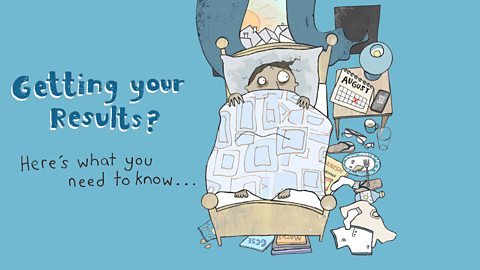This article was published in April 2025.
This year's GCSE results day falls on Thursday 21 August 2025, and if you're a student in England, Northern Ireland and Wales, then you'll be eagerly awaiting your grades. But you may be wondering how exam boards decide which marks you need to achieve each grade? This is known as grade boundaries, let us explain.
What are GCSE grade boundaries?
Grade boundaries are the minimum mark or score you need to achieve each GCSE grade. They are set once marking is nearly complete after students have taken the exam. Grade boundaries usually change each year to ensure fairness and consistency in the marking process, reflecting any differences in difficulty. To put it simply; the harder the paper, the lower the grade boundary. This means your grade shouldn't be worth any more or less than the same grade in previous years.
GCSE grades explained

GCSEs are graded differently in England, Northern Ireland and Wales. Scotland has a different qualification system, known as Nationals – our guide to Nationals grade boundaries is coming soon.
GCSEs in England
All GCSE subjects in England have been graded 1-9 since 2020, replacing the old A-G system, with 9 being the highest grade and 1 being the lowest, U means "ungraded".
Pupils need to achieve a 4 for a "standard pass" and 5 or above for a "strong pass". Grades 1-3 also count as a pass, but many colleges and sixth forms ask for a minimum of five GCSEs at grades 9 to 4, and some require you get at least a grade 6 or 7 in the subject you wish to study. Requirements will vary across schools and colleges, so it's always best to check and make sure. You will have to resit next year if you get a grade 3 or below in maths or English language.
GCSEs in Northern Ireland
In Northern Ireland, grades are A* to G, with a new C* grade being introduced in 2019. However, some students may take exams set by English boards, in which case they will also get results with grades 9-1. A guide to grading in Northern Ireland can be found here.
GCSEs in Wales
Welsh GCSEs are graded A* to G. Some GCSEs are modular, which means you have assessments throughout the year, whilst other GCSEs are linear, which means you take all exams at the end of the course.

How are grade boundaries set?
Grade boundaries are set using a process that is standardised across all exam boards. A group of senior examiners set the boundaries based on the difficulty of the paper, the performance of the students, and the quality of their answers, amongst other things.
Will grade boundaries be lower in 2025?
Grade boundaries are set once students have taken their exams and their papers are marked, so we don't yet know whether or not they will go up or down. But regardless of what the boundaries are, it's important to perform to the best of your ability in your assessments. You can't change grade boundaries, but you have the potential to improve your grade by studying, revising, and putting some of our exam essentials into practise.
Boundaries usually change each year, but the process is in place to ensure fairness for all students across different year groups, providing a consistent way to measure your achievements so that grades accurately reflect your knowledge, regardless of what year group you were in.
Where can I find more information about grade boundaries?
Grade boundaries can vary depending on exam board and subject.
- Information on AQA grade boundaries can be found here
- Edexcel grade boundary information is here
- To find out more about OCR grade boundaries, click here
- For Cambridge International grade boundaries, click here
- Details about CCEA grade boundaries can be found here
- For WJEC grade boundary information, click here

If you need support
You should always tell someone about the things you’re worried about. You can tell a friend, parent, guardian, teacher, or another trusted adult. If you're struggling with your mental health, going to your GP can be a good place to start to find help. Your GP can let you know what support is available to you, suggest different types of treatment and offer regular check-ups to see how you’re doing.
If you’re in need of in-the-moment support you can contact Childline, where you can speak to a counsellor. Their lines are open 24 hours a day, 7 days a week.
There are more links to helpful organisations on BBC Action Line.

GCSE and Nationals results day 2025: Looking after your wellbeing
Dr Radha gives some helpful advice on how to look after your wellbeing around GCSE and Nationals results day.

GCSE results day 2025: Everything you need to know
A guide to some of the important things you need to know for GCSE results day 2025.

Teachers' top tips for GCSE results day
We've asked some teachers to give their top tips on how to prepare for GCSE results day!
